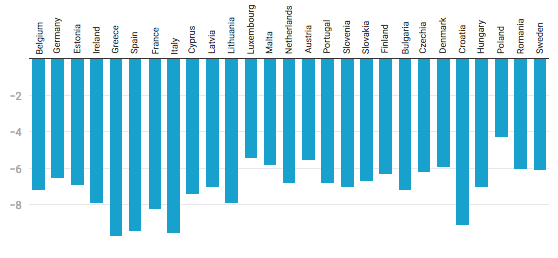The European commission has published spring 2020 economic forecast report and in the report, it said the the coronavirus pandemic (Covid-19) represents a major shock for the global and EU economies, with very severe socio-economic consequences. Despite the swift and comprehensive policy response at both EU and national level, the EU economy will experience a recession of historic proportions this year and will not recover until 2021.
The Spring 2020 Economic Forecast projects that the euro area economy will contract by a record 7.75% in 2020 and grow by 6.25% in 2021
The Real GDP of Greece, Spain, Italy and Croatia will contract by over 9% experiencing highest recession, while Poland will have the lowest recession 4.3%, shows the data tables.
It is worth noting that Greece, Spain, Portugal, Malta and Cyprus operate golden visa schemes in Europe. The total investment is set to drop by 30% in Greece, 8% in Portugal, 7% in Malta and 6.1% in Cyprus

The Commission said in its report
“The coronavirus pandemic has severely affected consumer spending, industrial output, investment, trade, capital flows and supply chains. The expected progressive easing of containment measures should set the stage for a recovery. However, the EU economy is not expected to have fully made up for this year’s losses by the end of 2021”.
| Real GDP | 2019 | Spring 2020 |
| Belgium | 1.4 | -7.2 |
| Germany | 0.6 | -6.5 |
| Estonia | 4.3 | -6.9 |
| Ireland | 5.5 | -7.9 |
| Greece | 1.9 | -9.7 |
| Spain | 2 | -9.4 |
| France | 1.3 | -8.2 |
| Italy | 0.3 | -9.5 |
| Cyprus | 3.2 | -7.4 |
| Latvia | 2.2 | -7 |
| Lithuania | 3.9 | -7.9 |
| Luxembourg | 2.3 | -5.4 |
| Malta | 4.4 | -5.8 |
| Netherlands | 1.8 | -6.8 |
| Austria | 1.6 | -5.5 |
| Portugal | 2.2 | -6.8 |
| Slovenia | 2.4 | -7 |
| Slovakia | 2.3 | -6.7 |
| Finland | 1 | -6.3 |
| Bulgaria | 3.4 | -7.2 |
| Czechia | 2.6 | -6.2 |
| Denmark | 2.4 | -5.9 |
| Croatia | 2.9 | -9.1 |
| Hungary | 4.9 | -7 |
| Poland | 4.1 | -4.3 |
| Romania | 4.1 | -6 |
| Sweden | 1.2 | -6.1 |
“Some Member States will see more significant increases in unemployment than others”, said the report.
The Spring Forecast is clouded by a higher than usual degree of uncertainty is based on a set of assumptions about the evolution of the coronavirus pandemic and associated containment measures. The forecast baseline assumes that lockdowns will be gradually lifted from May onwards. The risks surrounding this forecast are also exceptionally large and concentrated on the downside.
A more severe and longer lasting pandemic than currently envisaged could cause a far larger fall in GDP than assumed in the baseline scenario of this forecast, warns the report.
There is also a risk that the pandemic could trigger more drastic and permanent changes in attitudes towards global value chains and international cooperation, which would weigh on the highly open and interconnected European economy. The pandemic could also leave permanent scars through bankruptcies and long-lasting damage to the labour market.
The threat of tariffs following the end of the transition period between the EU and United Kingdom could also dampen growth, albeit to a lesser extent in the EU than in the UK.
The full report is available here





